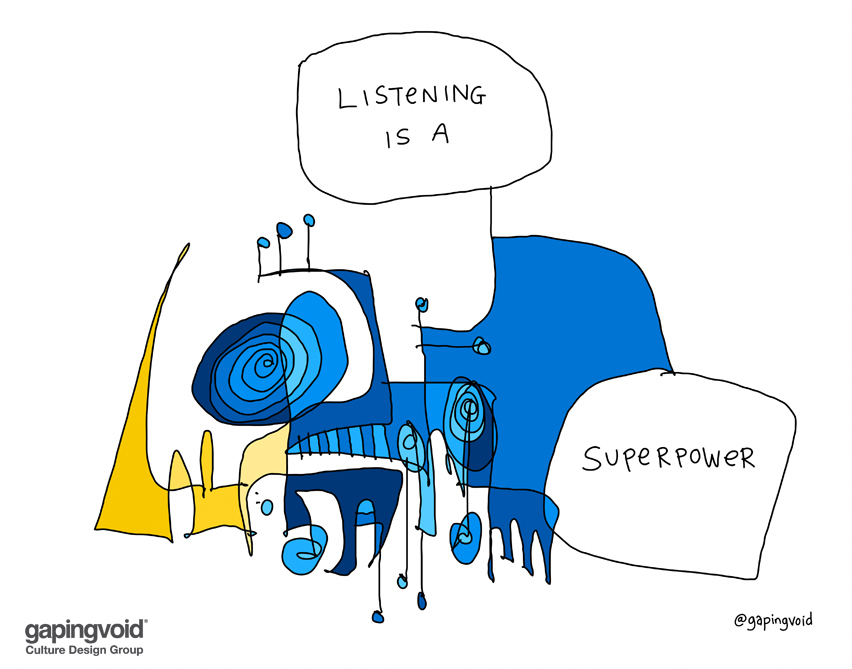
To begin, it always makes me smile that when I seek a phrase to google search for an image for a post, so often I find that Hugh McLeod of Gaping Void has drawn one, and today as I searched on the words Listening, Superpower, here we are again. Thank you once again for your visual expression of themes, Hugh.
You see, listening IS a Superpower, though it is empowering to recognise that we don’t have to be born on the planet Krypton, be bitten by a radioactive spider etc.
We all have this superpower within us!
Recently, encouraged and challenged by others to do so, I’ve been ruminating (and putting some of it on the page) about what I do, what I offer, what I bring to people in my work with them.
In “Letting the light shine in for others” I talked about this and noted: “Providing outside perspective in a supportive and deep listening way is what I do for others”.
Today let me focus on listening and share some of what I have learned about this superpower, but to begin I will share and reflect on thoughts from Simon Kuper, a writer for the FT.
Simon wrote an FT piece about two months ago called “Lessons in Listening”, and lessons for sure in this excerpt (and do read the rest of the piece) :
“I have studied good listeners — including spies, therapists and reporters (not columnists) — and tried to work out how they do it. The first step is to bin the preconception that the person you’re talking to is boring and predictable. Most people do have something worth saying, if only you can help them say it.
The second step is, therefore, to shut up. You may be aching to dive in and interrupt the speaker with a brilliant insight or joke, but don’t bother. He doesn’t want to listen to you either. As the British-spy-turned-Soviet-double-agent George Blake points out in his autobiography, “Most people are not particularly interested in your opinions or what you have to say, but very interested in voicing their own opinions and telling their own story.
Let them tell it. Blake suggests “making an occasional encouraging remark or asking for an elucidation”. Let silences fall, because people will often blurt things out just to fill them. A London lawyer tells me he always warns clients that when the barrister cross-examining them goes quiet (often simply to leaf through his notes), they need to keep their mouths shut.”
So, from this, and from my own experience, I share my own lessons to help you develop your listening superpower :
Be Curious
Everybody has a story to tell, and the deeper you listen, the more you give them your absolutely focussed presence, your authentic curiousity, the more you will learn.
Be Silent
Be silent. If in doubt, stay silent. Get comfortable with silence. Allow pauses, allow space and time for something to emerge. There is rarely any need to break the silence. Magic can happen when you are comfortable with silence and so create space for others.
Be Still
To listen deeply means more than listening for their words
By that I mean to truly listen to someone, and that takes stillness. It takes a quiet mind, it takes a still posture, it takes a steady yet at ease focus on the other person. We are not used to being deeply listened to in our typical interactions, so this can initially be uncomfortable to receive, yet we also know when this comes with the gift of authentic care and abundance.
Deep Listening – between the notes
As we practice listening, we can go deeper and deeper in listening and learn more, be of service more. The French composer Debussy said: “La musique, c’est ce qu’il y a entre les notes”. The poetically translated English version is “Music is the space between the notes”. The French more literally translates to “Music, it is what is between the notes”
I’ll write a post soon about how the greatest musicians play far fewer notes than we sense they have. They understand what Debussy meant.
Listen and you hear the words.
Listen more and you feel the emotion behind the words.
Listen deeper still and you sense all that is being communicated. A person’s music is what is between the notes.
Become truly practised at this with individuals and then you may be able to take this into a group environment. I adore working with teams of people by creating space through deep listening and opening them up to create alignment and understanding. I love doing this and also love being within a group that is expertly facilitated in this way, and the true masters at this know it is far more than words, listening is about what is “between the notes”.
